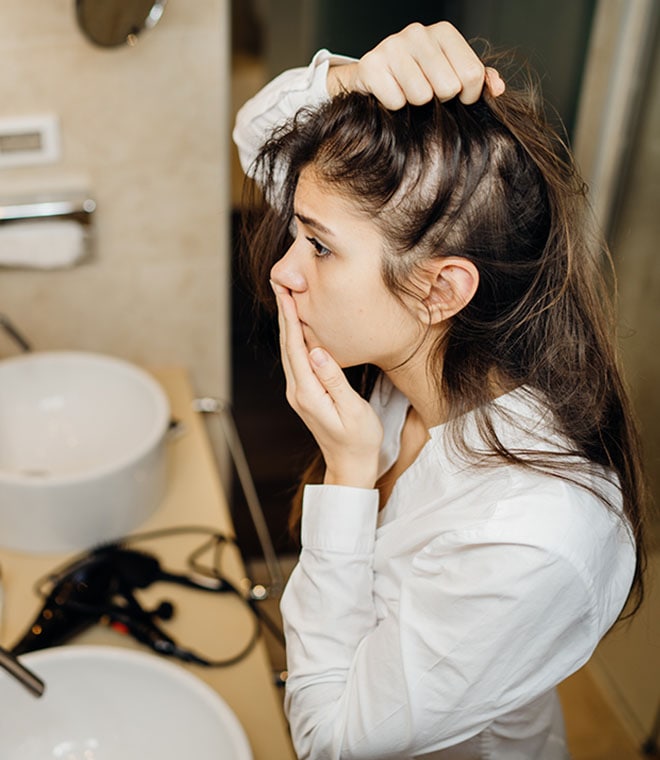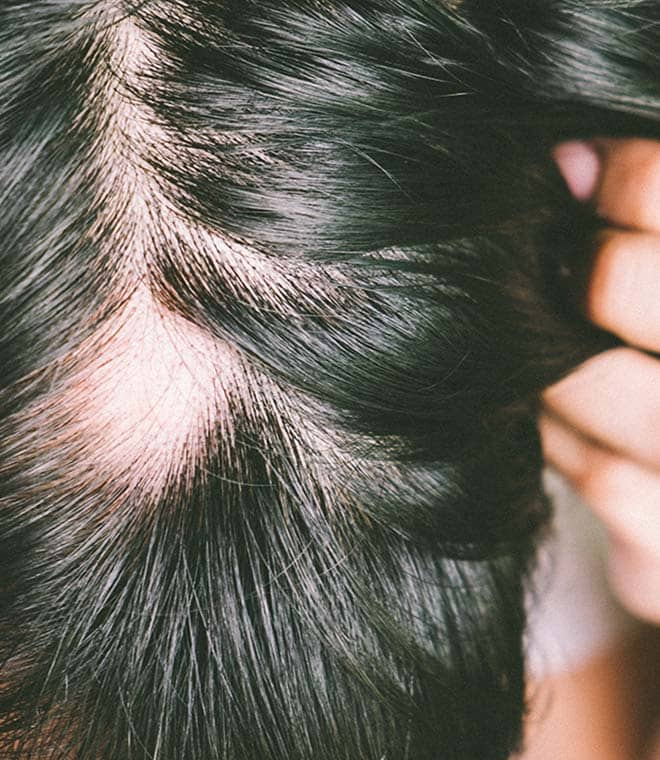Health
Is food causing my hair loss?
By Anna H. Chacon, MD, FAAD Dec 06, 2022 • 7 min
Scientific research hasn't found any foods that directly cause hair loss. However, your overall diet could impact hair growth. Getting too much or too little of a nutrient could lead to hair loss, as can your overall eating habits.
Nutrient toxicities that can cause hair loss
Excessive intake of vitamin A or selenium could result in hair loss. Normally, hair loss due to nutrient toxicities is temporary, and hair begins to regrow once the issue resolves.
Vitamin A toxicity
Vitamin A is important for immune system function and the health of the heart, eyes, lungs and other organs. However, very high doses of the vitamin can trigger hair loss. Typically, the liver stores vitamin A and releases it as needed. Excessive amounts of vitamin A can overload the liver, allowing the nutrient to travel into the bloodstream. When this occurs, hair growth may stop and shedding may accelerate.
Although vitamin A is found in dairy products, eggs, fish and organ meats, you're unlikely to experience vitamin A toxicity due to food. Most people who experience abnormally high vitamin A levels take potent supplements.
Selenium toxicity
An essential mineral, selenium is needed to produce more than 35 key proteins that are vital to reproductive, thyroid and immune health. However, at high doses, selenium may also trigger hair loss and other symptoms like nail brittleness, fatigue, bad breath and gastrointestinal issues.
Selenium is found in certain nuts, seafood, organ meats, dairy products and grains, but you're unlikely to consume toxic levels from food. Selenium toxicity is normally associated with high-dose supplements.
Nutrient deficiencies that can cause hair loss
Hair loss due to nutritional deficiencies is generally more common than thinning caused by vitamin A or selenium toxicity. A lack of iron, vitamin D, zinc or biotin has the potential to cause hair loss. Normally, increasing dietary intake of these nutrients through foods and supplements can address deficiencies. Once levels of the nutrient return to normal, hair loss usually stops and growth resumes.
Iron deficiency
The body needs the mineral iron to produce hemoglobin, a substance that carries oxygen throughout the bloodstream. People who suffer from iron deficiency may not produce enough hemoglobin, which can in turn restrict the amount of oxygen that reaches the scalp. If this occurs, hair growth may stop, and the body may begin shedding hairs faster than normal.
Adults most at risk for iron deficiency include:
- Pregnant women
- Women who experience heavy menstrual bleeding
- Individuals who donate blood frequently
- People with cancer, gastrointestinal disorders or heart failure
Lean meat, seafood, nuts, beans, some vegetables and iron-fortified cereals are among the best sources of iron.
Vitamin D deficiency
Vitamin D plays a role in many processes in the body, including neuromuscular and immune function, cell growth and reducing inflammation. Studies have shown that not having an adequate supply of vitamin D may contribute to certain hair loss conditions, like telogen effluvium (TE) and alopecia areata (AA).
The human body manufactures vitamin D in the presence of sunlight. It’s also found in a limited number of foods, such as egg yolks, fatty fish and cheese. Adults at an increased risk for vitamin D deficiency include:
- Older adults, since vitamin D production naturally slows with age
- Individuals who get little sun exposure
- People with dark skin tones
- Individuals with digestive issues that interfere with fat absorption
- People who are obese
Zinc deficiency
The mineral zinc helps control hundreds of reactions needed to produce proteins, power the immune system, heal wounds and create new cells. Hair loss is one of the most common symptoms of zinc deficiency. Adults most prone to low zinc levels include:
- Individuals with gastrointestinal disorders
- People who have undergone gastric bypass surgery
- Vegetarians and vegans
- Women who are pregnant or lactating
Meat, fish and seafood are among the best sources of zinc.
Biotin deficiency
Along with other B complex vitamins, biotin aids in metabolism and plays a role in many essential reactions. Hair loss is a common symptom of biotin deficiency. However, biotin deficiency is rare. It’s most common in individuals who chronically abuse alcohol, as well as women who are pregnant or breastfeeding.
Many foods contain biotin. Organ meats, eggs, fish, seeds, nuts, meat, sweet potatoes, spinach and broccoli are good sources of biotin.
Calorie restriction and weight loss
Severely restricting calories or losing a significant amount of weight can also cause hair loss. Specifically, sustained low calorie intake or a major change in body composition can put stress on the body, triggering a type of hair loss called telogen effluvium. With this form of hair loss, hair strands shift from the growth phase to the shedding phase at a faster than average pace. As a result, the scalp begins shedding hairs rapidly.
Although telogen effluvium can cause significant hair loss, the condition is usually temporary. If severe calorie restriction is the cause, hair growth will likely resume within a few months to a year after calorie intake returns to normal. Weight loss-triggered telogen effluvium will usually resolve within months of body weight stabilizing.
The best way to determine what's causing your hair loss is to talk to your healthcare provider. Only your medical provider can run the tests necessary to determine if a nutritional deficiency or toxicity may be triggering hair thinning and loss. If a nutritional deficiency or nutrient toxicity is to blame, they can recommend supplements or help you make dietary changes to address the problem.
Published December 2022.
Sources:
- https://doi.org/10.1007/s13555-018-0278-6
- https://nyulangone.org/conditions/hair-loss/types
- https://www.aad.org/media/stats-numbers
- https://www.aad.org/public/diseases/hair-loss/causes/18-causes
- https://medlineplus.gov/ency/article/001173.htm
- https://medlineplus.gov/genetics/condition/androgenetic-alopecia/
- https://ods.od.nih.gov/factsheets/Biotin-HealthProfessional/
- https://ods.od.nih.gov/factsheets/Biotin-Consumer/
- https://health.clevelandclinic.org/im-low-in-iron-can-this-cause-me-to-lose-my-hair/
- https://ods.od.nih.gov/factsheets/Iron-HealthProfessional/
- https://ods.od.nih.gov/factsheets/VitaminD-HealthProfessional/
- https://ods.od.nih.gov/factsheets/VitaminD-Consumer/
- https://ods.od.nih.gov/factsheets/Zinc-HealthProfessional/
- https://ods.od.nih.gov/factsheets/Zinc-Consumer/
- https://ods.od.nih.gov/factsheets/VitaminA-HealthProfessional/
- https://ods.od.nih.gov/factsheets/Selenium-HealthProfessional/
- https://www.merckmanuals.com/professional/nutritional-disorders/vitamin-deficiency,-dependency,-and-toxicity/vitamin-a-toxicity
- https://www.merckmanuals.com/home/disorders-of-nutrition/minerals/zinc-deficiency
- https://www.uptodate.com/contents/overview-of-water-soluble-vitamins
- https://www.health.harvard.edu/a_to_z/hair-loss-a-to-z
- https://www.aad.org/public/diseases/hair-loss/insider/shedding




